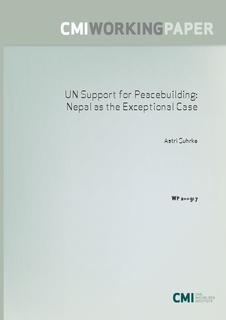| dc.description.abstract | In the annals of UN peace operations, the mission in Nepal (UNMIN) appears as an exceptional case. Most peace support operations today are multidimensional – covering the security sector, political transition, relief and economic recovery, statebuilding, and transitional justice – and target the underlying causes of conflict as well. Peacebuilding means ensuring that “exclusionary social, economic and political structures … [are not] left untouched, perpetuated or strengthened,” UN Secretary-General Kofi Annan declared when he inaugurated the UN Peacebuilding Commission in 2006. The language seemed tailor-made for Nepal, where the UN established a peace mission after the end of a ten-year civil war. Yet the UN operation to help consolidate peace in Nepal was a ‘focused mission of short duration’, a minimalist operation with a razor-thin mandate.
This paper explores why this was so, and what were the consequences for peacebuilding.
Was a limited UN mission appropriate to the challenges of peacebuilding, or was the mission unduly restricted? Did a high degree of Nepali ‘national ownership’ consolidate or complicate the peace process?
The paper was prepared for the project “Social Exclusion, Democratic Inclusion and the Insurgency in Nepal,” supported by The Social Inclusion Research Fund, which is funded by the Embassy of Norway, Nepal. Research for the paper was concluded in May 2009. | |
